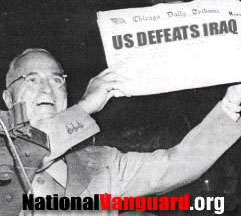Untitled Document

Don't be put off by the odd name -- 'Ghost Troop' is a very down-to-earth group
of veterans and journalists working behind the scenes to bring out the facts
about the Middle East War.
Millions have now discovered the meaning of 'BOBCUP' -- the Battle of Baghdad
Coverup.
ON APRIL 5, 2003, unit founder Captain Eric May detected major glitches in
the media pictures coming back from Baghdad, which US forces had just reached.
The reporters had gone from hopeful April 4 announcements that the siege of
Baghdad had begun, to worried April 5 announcements that there was a fierce
fight at Baghdad Airport -- then suddenly and without explanation away from
the developing battle to the "human interest" story that Private Jessica
Lynch had been saved from Iraqi captors.
To Captain May, whose areas of expertise included military intelligence and
public affairs, it was clear that the military and media were working together
to cover up the true story: The Battle of Baghdad was happening off-camera,
hidden behind Private Lynch!
The pull-down of the statue of Saddam Hussein on April 9 was another manufactured
event to indicate that the Baghdad had been occupied by US forces. But how did
they take the city?
The answer is that US forces were attacked by much-larger Iraq forces at the
Baghdad Airport on Saturday morning, April 5, and after bleeding badly from
that vicious fight were engaged in a fierce battle in the rubbled, slow-go driving
-- under constant Iraqi fire -- through the city of Baghdad, a drive lasting
until three days later, when the distraction of Private Jessica abruptly ended
so that the media could show a set-up scene of the "Fall of Baghdad"
(i.e., a set-up pull-down of Saddam's Statue).
While causalty figures have been suppressed by the media (along with the existence
of the Battle of Baghdad!), international military estimates are that hundreds
died. Summer/fall reports from Ft. Stewart, Georgia, about the overflow of 3rd
Infanty Division wounded soldiers sleeping in tent cities when they needed medical
treatment were never explained, either: There were too many wounded GIs from
the Battle of Baghdad to fit in the Ft. Stewart Hospital!
To Captain May, the cover-up of the battle was a clear violation of Department
of Defense Principles of Information, which he had learned thoroughly in the
Defense Department's Defense Information School, which he attended as a Public
Affairs Officer in 1994.
Frustrated with the indifference (or indecision) of the mainstream media in
ending the cover-up, he founded Ghost Troop, a unit specializing in Web contacting
and communications as the most effective, direct and honest medium left to a
public in need. Ghost Troop now comprises hundreds of loosely-affiliated members,
along with a few dozen staffers, mostly veterans, and is on a continuing mission
to force the mainstream media to acknowledge the dead of the Battle of Baghdad.
They have published extensively about the Battle of Baghdad, and their main
publications, "Ghost Troop Introduction" (2003) and "Ghost Troop
Home" (2004) have received 3 million hits since their creation. The story
is spreading, and more and more journalists are remembering their ethical duty
to tell the truth, not sugar-coat it. In fact, the Embedded Media itself seems
to be coming clean: This summer LA Times Embed David Zucchino published his
Thunder Run: Three Days with the Tusker Brigade in the Battle of Baghdad.
Captain May and his Ghost Troops were glad to see the bare existence of the
battle so long hidden on the front of a history book, but are still angry that
what has become history has never been reported as news! Inside the book the
main lines of the battle are still suppressed, along with the numbers of the
dead and wounded.
Ghost Troop's chief members are veterans from the services, with Navy, Air
Force and Marine Corps joining the original Army members to function together
in the best tradition of the military. They share tasks, contacts and new information
as they go along, thereby becoming perhaps the best experts around for a rational
discussion of the situation in Iraq, a matter so covered-up (like Baghdad) that
most of those who try to talk about things realistically end up in dead-ends
or contradictions.
As for May himself, the former general staff officer and, later, Houston Catholic
School Teacher of the Year hasn't changed his assessment of the situation in
the nearly three years since he began his mission of conscience to inform the
public. Going into the Iraq War, May published military analyses of the coming
conflict as op-eds in his hometown Houston Chronicle, predicting that Iraq would
be a "Quicksand War" and lead to a U.S. fiasco at best, and a world
war at worst. The op-eds are cyber-published as "Published Essays of Captain
May."
Similarly, his essay "3/7 Cavalry, Tragedy and Travesty," about the
unit that was first attacked and badly mauled by Iraqi forces at the Baghdad
Airport, has been published worldwide, both for the fact that it was written
within days of the cover-up and for the disturbing analysis of the United States
Constitution in a new era, with a new Watergate in BOBCUP, the Battle of Baghdad
Cover-up.
More on Captain May
Bibliography:
Zucchino's Thunder Run
Captain May's published essays:
http://www.geocities.com/onlythecaptain/pub.htm
3/7 Cavalry, Tragedy and Travesty (w/pic of Capt. May at Camp Casey, Crawford):
http://homepage.mac.com/kaaawa/iblog/C177199123/E20050823090852/
Press release:
http://neworleans.indymedia.org/news/2005/10/5809.php

